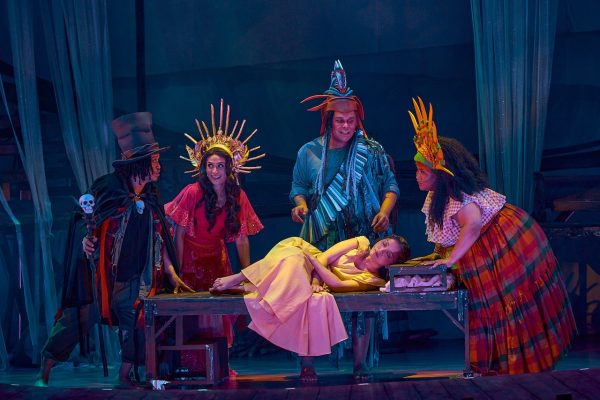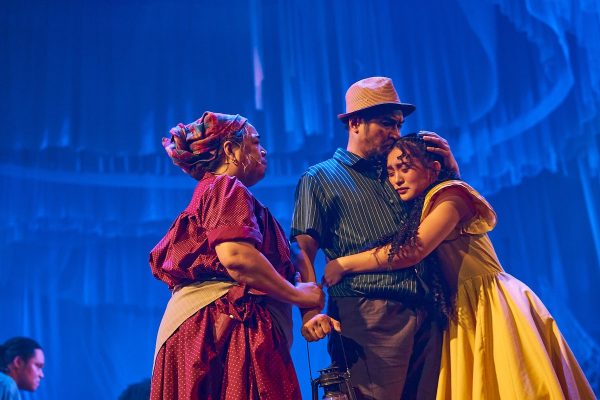
REVIEW: Romantic fantasy and bitter social reality clash in ‘Once on This Island’
This ‘Once on This Island’ doesn’t fully capture the material’s complex, tragic nature, even with stunning set pieces and intriguing narrative turns.
Stephen Flaherty and Lynn Ahrens’ Once on This Island presents specific cultural challenges for theater companies looking to stage it. Not only is it told through music and dance based in Caribbean forms, but its narrative—based on Rosa Guy’s novel My Love, My Love; or, The Peasant Girl—proceeds like a folk tale simultaneously occurring in the past and being recreated communally in the present. This production from 9 Works Theatrical has no trouble transporting these elements to a Filipino stage without exoticizing or trivializing them, resulting in a particularly unique experience for a ‘90s Broadway musical.
Where this show stumbles, however, is in reconciling its romantic fantasy—a peasant girl defying the gods to save a rich boy’s life—with the thornier issues of class and race at its root. This Once on This Island doesn’t fully capture the material’s complex, tragic nature, even with stunning set pieces and intriguing narrative turns.
Good Bones
The bones of this production are all certainly in place, and more than help open up the show to complex readings. Mio Infante’s set consists of a circular catwalk, with billowing cloth overhead to help amplify the forces of nature in the story, while most of the action takes place in the enclosed (though frequently overcrowded) pit. Immediately the stage evokes the idea of a larger world beyond what we see, and strict borders enforcing these divisions. Moreover, the central idea of “circular” storytelling—of continuing to retell myths and legends over generations—informs not just what we see, but how the characters travel, inevitably returning to where they started.
Flaherty’s score is similarly at its best when surrendering to the feel of a ritual performed by the whole community. Chorus vocal arrangements (music directed by Daniel Bartolome) and booming solos by Radha and Garrett Bolden are warm and welcoming, and still power through despite the often muffled and imbalanced sound mixing on opening night. Beautifully rhythmic dance sequences (choreographed by JM Cabling) are charged with an even more vivid sense of celebration through the orchestra’s Caribbean-style percussion—so much so that you wish the musicians could be integrated more visibly on stage.

Clockwise: Garrett Bolden, Radha, Angela Ken, Lorenz Martinez, Jasmine Fitzgerald; Photo Credit: Reine Paisley | 9 Works Theatrical
Love or Defiance?
Fortunately, the character who does take center stage gets to be far more interesting than a generic Juliet or Ariel analogue. The story of Once on This Island isn’t so much about naïve youth or star-crossed love, but a tale of defiance against the rules and systems which people are born into and made to accept. When Ti Moune (played by Angela Ken in this performance being reviewed; alternating with Thea Astley) asserts that her purpose is to heal and fall in love with wealthy Daniel (Sam Concepcion in this performance; alternating with Jef Flores), it doesn’t ring foolish so much as it becomes a rejection of the hand she’s been dealt as an orphaned peasant.
As Ti Moune, Ken fully inhabits the character’s innocence and purity of spirit, but leaves plenty of room to feel the turmoil of a young woman who realizes she is both vulnerable to and capable of humanity’s cruelty. Meanwhile, Ti Moune’s adoptive parents Mama Euralie (Lani Ligot) and Tonton Julian (Noel Rayos; alternating with Raul Montesa) bring moments of painful intimacy as they struggle to accept her strange but earnest decisions. But the musical is arguably more memorable as an ensemble piece; the ensemble members, or “storytellers,” thankfully don’t get trapped behind their accents, and are able to collectively play both past and present, individual characters and omniscient spectators, by moving as one.

L-R: Lani Ligot, Noel Rayos, Angela Ken; Photo Credit: Reine Paisley | 9 Works Theatrical
Why Do We Tell This Story?
However, because the show is so interesting as a subversion of the Little Mermaid-style template—where the storybook romance is instead deconstructed and made to serve a greater community—it causes some whiplash that its loaded ending sequences are directed with a lighter touch than they deserve. Director Robbie Guevara is well-intentioned in not wanting to linger on the more tragic aspects, relieving tension by returning to the omniscient storytellers who quickly reassure us of the brighter side of things. But, as a result, the ending he crafts for Ti Moune’s reality of poverty and racial discrimination feels oddly hurried. As the festivities take over in the final song, it’s as if the peasants’ suffering is being hastily waved away, rather than allowing the storytellers to communicate the full, bittersweet weight of their history.
Visually, the finale adds some splashes of new color to the backdrop and once again overcrowds the center of the stage with people, but all of this comes off as a distraction from the darkness rather than an effort to deepen the way we think of what had just transpired. Guevara goes for a more emotionally simplified ending that still expresses sympathy for the peasants, but doesn’t contend with the actual cost of their struggle. As the characters sing about “why we tell the story,” it feels as if so much of Ti Moune’s tale and its aftermath is left out. Many oppressed peoples today continue to persist despite their struggles, and it seems like the story of their persistence deserves to be retold as well. It should be possible to sing and dance even to hardship with joy and hope.
Tickets: P2200 – P3900
Show Dates: Sep 6–29 2024
Venue: Carlos P. Romulo Auditorium, RCBC Plaza, Makati City
Running Time: 1 hour and 30 minutes (without intermission)
Credits: Stephen Flaherty (Music), Lynn Ahrens (Book and Lyrics), Robbie Guevara (Direction), Daniel Bartolome (Musical Direction), Mio Infante (Scenography and Costume Design), Shakira Villa-Symes (Lighting Design), JM Cabling (Choreography), Lionel Guico (Vocal Coaching)
Cast: Angela Ken, Thea Astley, Sam Concepcion, Jef Flores, Garrett Bolden, Radha, Lorenz Martinez, Shiela Valderrama-Martinez, Jasmine Fitzgerald, Raul Montesa, Noel Rayos, Lani Ligot, Shanaia Gomez, Krystal Kane, PJ Rebullida, Jonjon Martin, Sam Libao, Jordan Andrews, Fay Castro, Bianca Estacio, Reese Iso
Company: 9 Works Theatrical


Comments